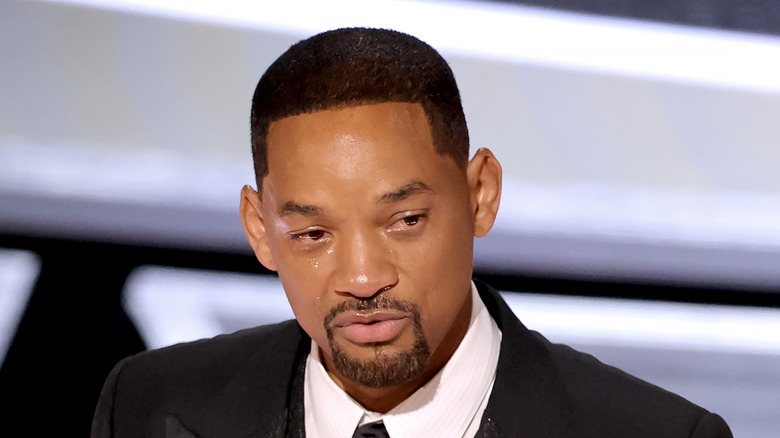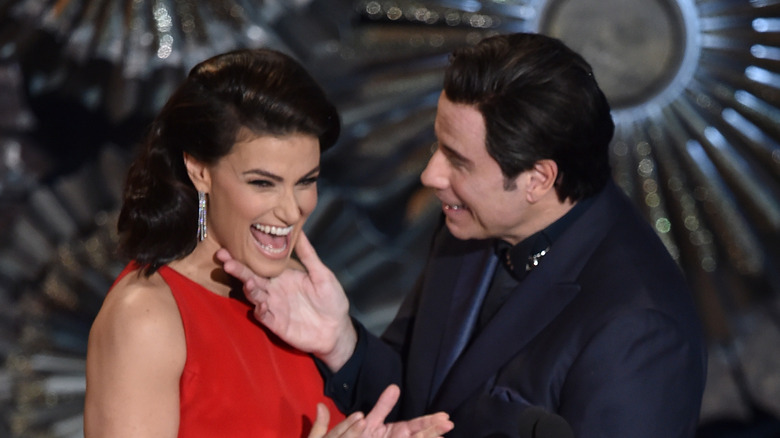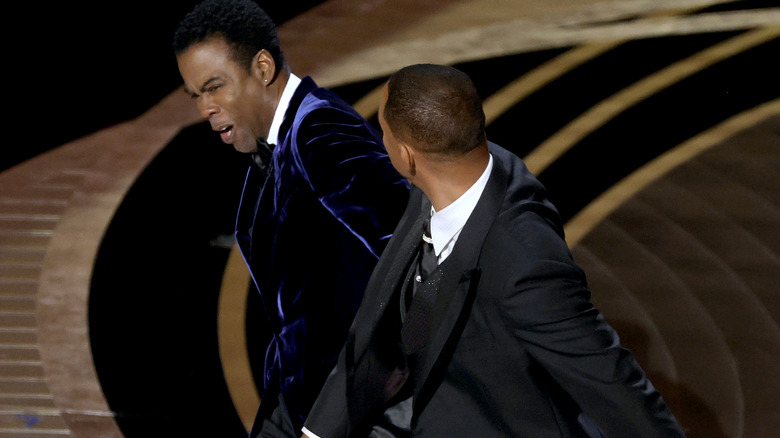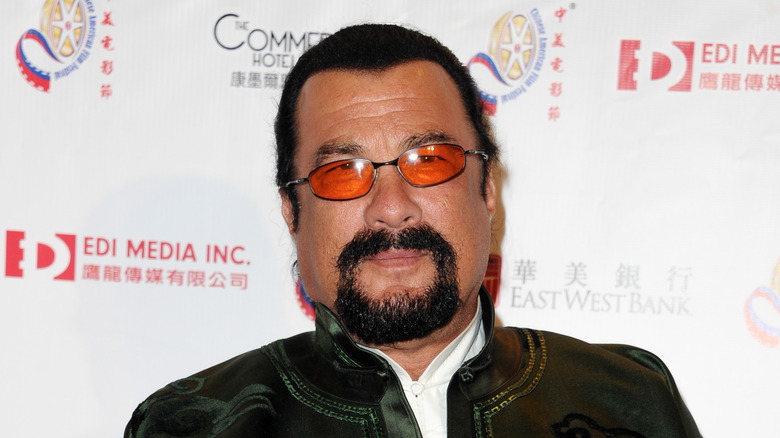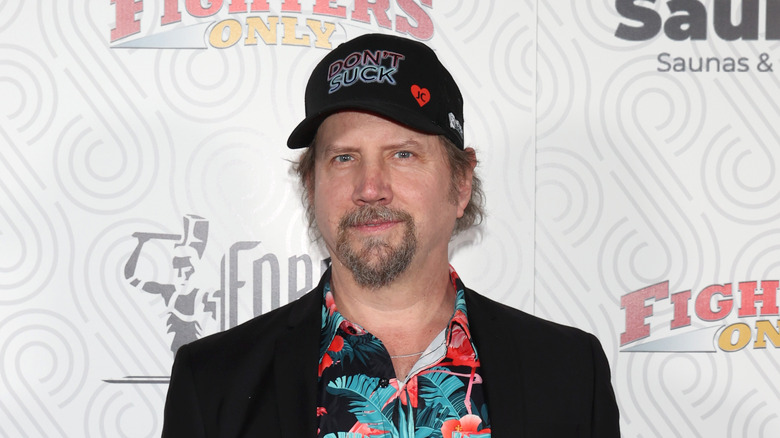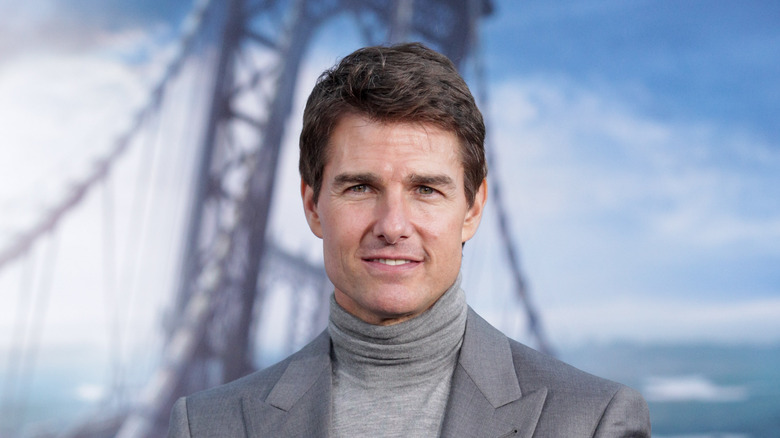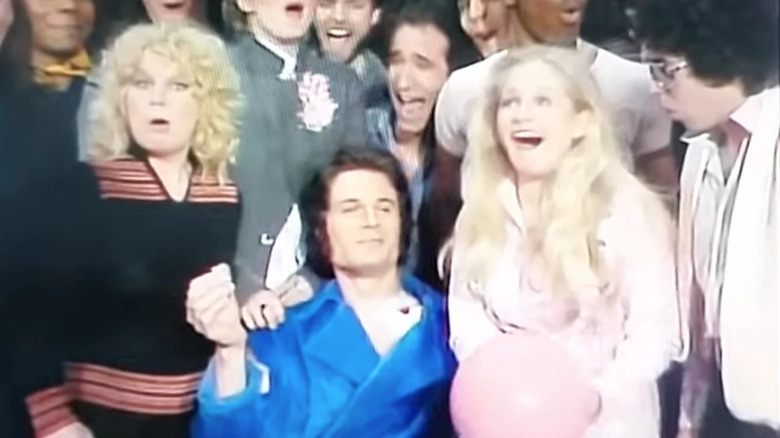Actors Who Ruined Their Careers On Live TV
A great television appearance can be all it takes to make an actor's career. Unfortunately, the small screen can take just as easily as it gives. As numerous actors have found out to their personal and professional distress, a single unwise or failed live TV appearance can act as a launching pad for a massive career crisis. People love a scandal, after all, especially when it unfolds right in front of their eyes in real time.
Some of these celebrities have managed to rebound from the event and rebuild their careers after a period of difficulty. For others, the fateful moment marked the start of a downward spiral that, in some cases, was so steep that when people think of them today, they might still mainly remember this one thing — the worst moment of these celebrities' public lives. Here's a closer look at how actors have managed to destroy their careers on live television.
John Travolta's pronunciation gaffe made waves
At the 2014 Academy Awards ceremony, John Travolta was supposed to introduce a star musical performer — Idina Menzel, the Broadway star who was set to perform the hit song "Let It Go" from "Frozen." Unfortunately, he got the singer's name as wrong as wrong can be and announced Menzel as "Adele Dazeem," to the delight of the meme-making corner of the internet. While the pair poked fun at the incident at the 2015 Oscars, things once again got a little weird when Travolta kept touching Menzel's face in a stunt that was pre-planned but looked more than a little awkward.
So, did Adele Dazeem single-handedly destroy Travolta's career? It might seem unlikely, but weirdly, the numbers are on this theory's side. Apart from a turn as Robert Shapiro in the acclaimed true crime drama series "American Crime Story," almost all of Travolta's post-2014 projects have been critically-panned turkeys, and per the film industry database The Numbers, the actor's star power started dimming considerably nigh-immediately after the incident.
Maybe Adele Dazeem was a watershed moment for Travolta's cultural net worth, or perhaps it's all just a coincidence. What can be said with certainty, however, is that the incident benefitted Menzel greatly. "It ended up being one of the best things that happened for my career because all the people that had no idea who I was were like ... 'Who is this girl?'" she said in a 2021 interview with Today's Sunday Sitdown.
One slap turned Will Smith's victorious night into a nightmare
The 2022 Academy Awards could have been the greatest night in Will Smith's professional life. Instead, what unfolded has become known as one of the Oscars' most controversial moments of all time.
You may have witnessed the incident yourself, either when it unfolded live during the ceremony or in the subsequent media barrage. Host Chris Rock cracked a joke at the expense of Smith's wife, Jada Pinkett-Smith. Smith replied by walking up to Rock, slapping him in the face, striding back to his seat, and following up his physical assault with some verbal, expletive-filled grandstanding. What's more, Smith couldn't just slink away from the ceremony afterwards. He was up for the best actor award, which he went on to win, spending part of his tearful acceptance speech to give one of the worst apologies a celebrity has made publicly.
It's hard to measure how much the slap has impacted Smith's public profile, since he's been uncharacteristically — though understandably — quiet on the movie front since the incident. His sole 2022 movie, "Emancipation," came out on Apple TV+ and thus its success can't be measured by conventional box office numbers. As an Oscar-winning A-lister, Smith has kept working, and even if the screen roles dry up, he has his producer career to fall back on. Still, regardless of what the future holds for him, it's probably fair to say that the 2022 incident has severely tarnished his family-friendly image.
Steven Seagal bombed as an SNL host
There are many false "facts" about "Saturday Night Live" out there, but the one you may have heard about Steven Seagal being possibly the show's worst host ever is very true. Seagal hosted one fateful show on April 20, 1991, and did a legendarily awful job. He showcased zero sense of humor, acting ability, or basic cooperation skills, resulting in a humorless and uncomfortable affair. Seagal never returned to host but has been imitated on the show multiple times.
Being a horrible "SNL" host didn't immediately end the martial arts man's career, but it's clear that it was a pivotal moment in the rise and fall of Steven Seagal. As pointed out by the film critic known as Vern in his book "Seagalogy," 1991 marks the end of the star's so-called "golden era." He still had a few successes lined up, including his arguably best movie, 1992's "Under Siege." Still, not long after the "SNL" gig showcased Seagal's weirder side to the world, he stopped being the implacable action man as news about his more questionable traits started coming out.
These days, Seagal is well known for stories of him physically (and allegedly sexually) abusing colleagues, and the often-reported tale about legendary martial artist Gene LeBell humiliating Seagal by choking him out so hard that Seagal had a bathroom mishap in his pants. As for his movie output, Seagal soon drifted into the land of straight-to-DVD, where he resides whenever he's not promoting Vladimir Putin and Russia.
Jamie Kennedy's disastrous New Year's special
After comedian Jamie Kennedy broke through as Randy Meeks in 1996's "Scream," he started turning up in movies that featured folks like Will Smith, Eddie Murphy, and George Clooney. He also had a sweet, varied TV career with projects like his own "The Jamie Kennedy Experiment," the CBS supernatural procedural "Ghost Whisperer," and the animated "The Cleveland Show." Since around 2013, however, his roles have been mostly obscure.
As it happens, there's a particular abysmal live TV event that coincides with this career timeline: "First Night," a Kennedy-hosted 2012 New Year's Eve special on a California TV station called KDOC. The event turned out to be so awful that it ended up going viral. It was a chaotic, troubled affair where few things worked, Kennedy and others often seemed out of their depth, and a brawl broke out at the closing moments, prompting the host to beg the viewers to go watch something else.
In an interview with The New York Times, Kennedy insisted that the messiness was intentional. "It was totally supposed to be like that," he said. "We wanted to make almost an anti-New Year's Eve show, and the recipe calls for unexpected. We had an open bar for our guests, we were unrehearsed. It was not glamorous." He also expressed a wish to do similar specials in the future. However, this was the last night of "First Night," and Kennedy has since focused on things like straight-to-video "Tremors" sequels.
Tom Cruise experienced early internet culture first-hand after his couch-jumping interview
Seeing what a Hollywood juggernaut he's become, it's strange to think that Tom Cruise's career has ever taken a hit. Considering how calm and collected he seems, it's even more difficult to believe this happened because of his own behavior during a live TV interview. However, the world was a different place when Cruise appeared on "The Oprah Winfrey Show" in May 2005. He ended up spending quite some time talking about his relationship with Katie Holmes, and was so hyper about it that the more dramatic parts of the interview became a meme. Soon, fans and media outlets started questioning the star's sanity based on this erratic behavior. The incident hurt his star power and caused Paramount to back away from a massive long-term deal with him.
Cruise's couch-jumping interview came at an age where internet culture was starting to seriously step on the toes of celebrity culture. These days, online outrage tsunamis over a famous person's perceived wrongdoings are commonplace, but Cruise was arguably the first major celebrity to experience the whole gamut of the internet making fun of him like only the internet can. For a good while, his previously awe-inspiring name was shorthand for mental illness — a truly strange experience for someone whose media portrayal had traditionally been squeaky clean. As history has shown, Cruise ended up recovering quite well. Still, think of him what you will, but the experience must have been terrifying.
Charles Rocket dropped a Saturday Night Live F-bomb
Some of the most controversial "Saturday Night Live" skits have jumped headfirst into politics or various cultural issues. Charles Rocket, on the other hand, took a different route during "SNL" Season 6. The show's producer at the time, Jean Doumanian, had pegged him as the potential superstar of the season's cast, which is saying something. After all, the show had already featured comedians such as John Belushi, Chevy Chase, and Bill Murray. Rocket's new set of "SNL" co-stars also included a guy called Eddie Murphy, who went on to become pretty successful himself.
Rocket never got the chance to become such an illustrious name. After ending a "Dallas"-themed sketch on the February 21, 1981, show by inserting a casual F-bomb in his final line, he promptly got fired from the show. Doumanian's tenure with the show had already been troublesome, as evidenced by the fact that it produced what's considered to be one of the worst "Saturday Night Live" seasons ever. After Rocket's four-letter word, the executives had had enough. The producer and Rocket made their apologies and were soon shown the door.
Rocket didn't stop acting. He became a TV journeyman with a laundry list of guest star stints and recurring roles. He even had roles in major films like "Dances with Wolves" and "Dumb and Dumber." Still, his screen career was never even close to the heights of the "SNL" stars he was once compared to.
If you or someone you know has been a victim of sexual assault or needs help with mental health, help is available.
- Visit the Rape, Abuse & Incest National Network website or contact RAINN's National Helpline at 1-800-656-HOPE (4673).
- Contact the Crisis Text Line by texting HOME to 741741; call the National Alliance on Mental Illness helpline at 1-800-950-NAMI (6264), or visit the National Institute of Mental Health website.
